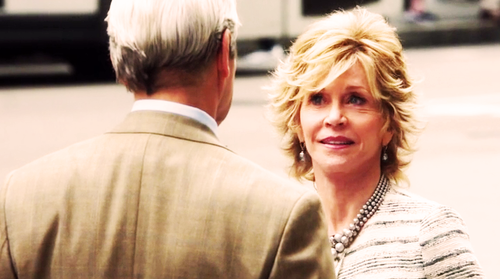
[Spoiler Alert! – Latest Episode] The second Will McAvoy admits fault, he’s started on a path toward redemption – and Aaron Sorkin’s The Newsroom along with him, in perhaps its best episode so far. We postmoderns are on a long, brutal hangover from idealism – especially its horrific twentieth-century manifestations – and, like a last-night drunk being offered a gin and tonic, we’re extremely allergic to anything that reminds us of our tendency toward theologies of glory. Cue the voyeuristic obsession with depravity on TV that’s characterized its “Golden Age”, as well as the scathing reviews Newsroom’s Season 1 received. The idealism, the hope for a more responsible way of doing news, and especially the shining characters capable of pulling it off have generally made critics want to throw up. But it’s true that people are usually most allergic to the qualities of themselves they don’t like manifested in others – scapegoats provide a convenient way to externalize self-recrimination.
And so the backlash against idealism of any kind: recent history has proven our satisfaction with ideologies to be ephemera, and anything appealing to the deeply-rooted parts of ourselves that crave ideology is to be extirpated. It is our own inner theologians of glory we recognize in someone like the Sorkin of Season 1, and we can distance ourselves from it by criticism.
Sorkin, however, works out these tensions, manipulating his audience’s inner idealists and inner critics to produce something of a marvel in Season 2. Last night’s episode contained the big reveal and finally, (finally,) we know what’s going on in the courtroom.
Those who loved the first season (like me) tended to find, without much regard to where it landed on the Left-Right spectrum, found a sense of do-gooder, holier-than-the-mainstream-American-political-dialogue to hook us into the show. It was rightfully considered sanctimonious and self-righteous, because it was. The question of the story’s quality would not be one of whether or not this righteousness was justifiable (it isn’t) or plausible (it is), but whether or not it could be maintained. Urban Meyer, at the pinnacle of his career, said that “maintenance is hell.” Sorkin’s vision of righteousness may have been upsetting to a seasoned postmodern critics’ audience, but the question of its theological merit would be whether or not this righteousness could be maintained. For most of Season 2, we’ve had a vague sense of foreboding because of an innate sense that the quasi-utopian Season 1 News Night could not last, as well as the opening courtroom (!) scene in the newest season. But I had thought that Sorkin would become introspective and ‘dark’ just to satisfy the critics, while keeping the show’s fundamental sanctimony in the character of Will McAvoy, who would stand unscathed above the Genoa debacle while an external source of failure/evil/disruption, in the form of Jerry Dantana, would take all the fall.
Well, last night’s episode proved that assumption wrong. It turns out all of Season 2 has been about making Dantana the bad guy, as ACN has made him the scapegoat (!) for the false accusation of the US government of a war crime. Though the phrase “wrongful termination” was used a couple of weeks ago, it wasn’t until tonight that we finally understood what’s happening: Jerry is claiming he was made to take the fall for an “institutional failure.” Thus the court case is not a criminal suit of ACN (i.e., “were they wrong?”) but a more internal case – “knowing we’re wrong, who do we blame?”
Alexander Solzhenitsyn talked about totalitarian ideologies as the need to externalize evil from yourself and the failure to recognize that the line between good and evil “cuts through the heart of every human being.” People who bought into Season 1’s Edenic portrait were elated to hear, last night, that Dantana did take the fall – justice was served, and our hero was exculpated. Or in television terms, our characters are alright. It’s the new guy they brought in who’s responsible for this. So we’re vindicated in our identification with the totally good, (professionally) un-fallen McAvoy – until a few minutes later, when he finally tells the lawyer that it was an institutional failure: they were all to blame, and the hiding and scapegoating and blame-shifting are illusory.
One reason the contemporary obsession with dark TV falls short of truly good anthropology is that the viewers and critics can externalize their own inner theologians of glory, which are never engaged by the TV script. That is, we can praise dark shows for agreeing with our nominal post-idealism, and we can trash shows like The Newsroom for clinging to the old decrepit optimism about institutions. Sorkin goes a step further by forcing us to buy into that idealism, for a time, and then stripping us of it in our hero’s admission of guilt. One of my favorite Scorsese cuts was a scene in Goodfellas with a family picnic glorifying mob life; the next instant is glass breaking as the young mobster protagonist is breaking windshields. It’s a cut that’s extraordinarily jarring both visually and auditorily, but it only almost matches the emotional jar when our own glory-narratives are stripped.
If idealism is the prime evil in contemporary TV, then Sorkin has recognized the interiority of Solzhenitsyn’s dividing line. It is not enough to say that humans are bad and idealism misguided without recognizing the idealism within ourselves. It’s true that Sorkin, still, hasn’t recognized in any full way the same low anthropology that shows like Breaking Bad make crystal-clear. But Scorcese’s first step – inviting his viewers to admit their inner optimist’s existence – is an extremely unpopular one, and one that The Newsroom suffered (in critical reception) from taking. Season 1 took this step, Season 2 has (at last) admitted a fall. Where the show goes from here, and how Sorkin navigates the tension between admitted optimism and revealed pessimism, is uncertain. But at this point, it certainly deserves a second look.
[youtube=http://www.youtube.com/watch?feature=player_detailpage&v=w4m8LtJ_WPs&w=600]

COMMENTS
Leave a Reply















